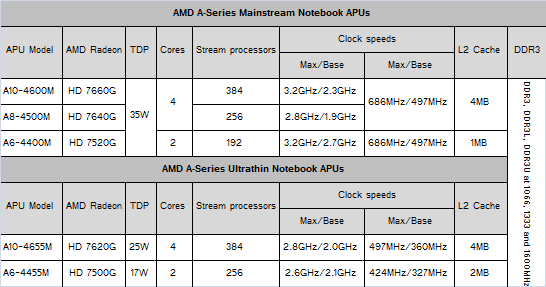AMD Introduces 2nd Gen Fusion Trinity Chips for Notebooks
Peter Donnell / 13 years ago

Advanced Micro Devices on Tuesday officially introduced its new-generation of Fusion A-series accelerated processing units (APUs) previously known as Trinity. The new chips feature new x86 code-named Piledriver cores and Radeon HD 7000-series graphics cores. AMD hopes that its new APU will help it to increase presence on the market of various notebooks.
“The latest OEM notebooks, ultrathins, all-in-ones and desktops based on the new AMD A-Series APU enable the best video and gaming experiences, highly responsive performance with AMD Turbo Core, and accelerate an ever-increasing range of productivity and multimedia applications — in sleek, stylish designs at price points that make sense,” said Chris Cloran, corporate vice president and general manager of AMD client business unit.
The AMD A-series “Trinity” APUs feature up to four x86 cores powered by enhanced Bulldozer/Piledriver architecture, AMD Radeon HD 7000-series graphics core with DirectX 11-class graphics support, DDR3 memory controller and other improvements, such as new dynamic acceleration Turbo Core technology, improved video playback engines and so on. The new chip is made using 32nm process technology at Globalfoundries, just like its predecessor code-named Llano, but thanks to architectural improvements it is projected to be 25% – 50% faster – depending on the task – than the first-gen A-series APU.

“Our second-generation AMD A-series APU is a major step forward in every performance and power dimension, allowing users to enjoy a stunning experience without having to give up the things that matter to them most. This experience doesn’t stop at mainstream notebooks. It carries over into affordable ultrathin form factors featuring the latest in AMD Radeon graphics,” added Mr. Cloran.
The initial family of AMD A-series Fusion “Trinity” chips currently includes only five models with 17W, 25W and 35W thermal design power.

AMD claims it has a record number of design wins with companies like Acer, Asus, HP, Lenovo, Samsung and Toshiba based on its new AMD A-series APUs, with mainstream and ultrathin notebooks as well as embedded solutions, available beginning today.
Source: XbitLabs



















